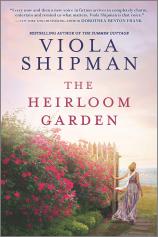The Heirloom Garden
Review
The Heirloom Garden
Grief is a peculiar thing. And that’s probably the nicest thing one can say, especially when in the midst of it.
Like certain weeds that infiltrate desirable plants by mimicking their foliage and exact shades of green, grief sends its tentacles into unanticipated spaces, ambushing the emotions, and sometimes changing one’s dreams so subtly that we don’t recognize exactly when we morphed into quite different people. And, more often than not, we do not particularly like those different people into which grief has transformed us.
This is what happened over inexorable decades of isolation to Iris, in THE HEIRLOOM GARDEN by Viola Shipman (the pen name of critically acclaimed American memoirist and novelist Wade Rouse). A passionate gardener twice bereaved --- losing first her husband at the end of WWII, then her only child to polio just a few years later --- Iris has found solace in the ever-changing colors and patterns of her large walled garden, pouring her creative energies into hybridizing her beloved daylilies into uniquely beautiful floral masterpieces.
"Shipman navigates real and substantial issues of grief, pain and healing through a lively and engaging story that exquisitely balances those deep and serious themes with the ever-emerging beauty that gardeners may know best..."
Early in the novel, however, she slowly transitions from an arm’s-length role as landlord to a young family renting her grandmother’s former home next door, to a reluctant but engaging catalyst for the healing of their different but equally debilitating griefs.
Abby, a gifted scientist-engineer whose line of floral-inspired paint colors results in major profits for her male-dominated corporate employer, is too angry at her boss’s exploitative strategies to realize at first that she is actually experiencing grief at the loss of professional identity, affirmation and recognition.
Her husband Cory, recently returned from combat in Iraq with severe PTSD, is tormented by the nightmares and daily fears it induces. He is also far more acquainted with his anger than with the deep grief that drives it, and immobilizes his will to seek therapeutic help.
Their daughter, Lily, is too young to know that the sadness and anxiety she feels over her father’s inability to keep her safe, and her mother’s preoccupation with work, are also forms of grief.
In her wise innocence, Lily insists on befriending Iris because, after all, hers is a flower-name too, and they are both alone. It never occurs to her that Iris might not know she needs a friend, and therein lies the utter charm and power of this unlikely relationship, which the author develops with gentle clarity in very believable real-time events.
Step by step, Iris’ surrogate “family” of flowers becomes a place of wonder for Lily, who absorbs knowledge like a dry sponge and shares it exuberantly with her troubled parents, to the point where they too are drawn into the walled garden that had stood so long as a bulwark against the outside world.
Through flowers, stories about them, flashbacks to previous joys and terrors, and the challenges of everyday encounters outside their respective physical and psychological walls, each and every character of THE HEIRLOOM GARDEN grows beyond grief and pain to embrace things that really matter and keep us going through the toughest of times --- trust, courage, empathy, optimism and, of course, love, the greatest power of all.
Shipman navigates real and substantial issues of grief, pain and healing through a lively and engaging story that exquisitely balances those deep and serious themes with the ever-emerging beauty that gardeners may know best, but is freely shared with all who care to stop, look, smell and listen with an open heart.
Grief may be a peculiar thing indeed, but in THE HEIRLOOM GARDEN, it doesn’t get the last word.
Reviewed by Pauline Finch on May 29, 2020
The Heirloom Garden
- Publication Date: April 28, 2020
- Genres: Fiction, Women's Fiction
- Paperback: 448 pages
- Publisher: Graydon House
- ISBN-10: 1525804618
- ISBN-13: 9781525804618




